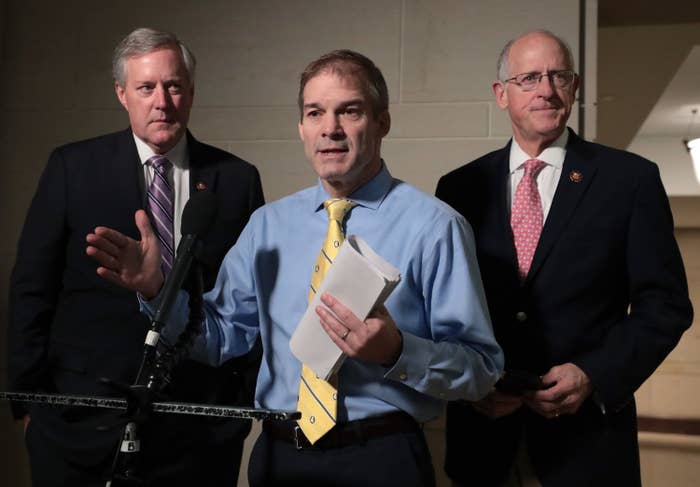
[The Impeachment Today podcast gets you up to date with the day’s most important impeachment news. Catch up on all the episodes, or subscribe on the iHeartRadio app, Apple Podcasts, Spotify, or wherever you listen to your favorite shows.]
WASHINGTON — House Republicans want to out the identity of the whistleblower whose memo helped trigger the impeachment inquiry into President Donald Trump, despite legal protections granting anonymity.
Democrats accused Republicans of using Tuesday’s testimony behind closed doors to try to root out the identity of the whistleblower who wrote the now-famous memo alleging Trump demanded a political favor from Ukraine in exchange for military aid. Republicans accused Democrats of shutting down valid questions.
The name of who authored that whistleblower complaint has been a closely guarded secret under the provisions of the Whistleblower Protection Act. The person, who is reportedly a CIA officer, has interacted with the House impeachment inquiry via their lawyers, but Trump’s champions in Congress say they should no longer be granted anonymity.
“What do you think? Of course,” said Rep. Jim Jordan, when asked if the whistleblower’s identity should be made public.
Rep. Mark Meadows, one of Trump’s closest allies, said he is “80% sure” who the whistleblower is, and has narrowed his list down to three or four candidates. He said he does not agree that the Whistleblower Protection Act guarantees blanket anonymity. Meadows said Republicans are not outing the whistleblower — they can’t since they don’t know the identity.
“If I had a degree of certainty who the whistleblower is, I promise you I would tell you,” said Meadows.
Mark Zaid, one of the whistleblower’s lawyers, told BuzzFeed News that speculating about his client’s identity is “the pinnacle of irresponsibility and is intentionally reckless” behavior by members of Congress who should know better.
“The speculative discourse of the name of any person who may be suspected as being the whistleblower places that individual and their family in great physical danger,” said Zaid. “Any physical harm the individual and/or their family suffers as a result of disclosure means that those who led to the release of such names will be personally liable for that harm.”
The fight over the whistleblower’s identity flared up during the closed-door impeachment inquiry Tuesday. It began as members interviewed National Security Council official Alexander Vindman, who was on Trump’s July 25 call with Ukrainian President Volodymyr Zelensky.
Vindman reported concerns to his superiors that the Trump administration was pressing Ukraine for help investigating former vice president Joe Biden.
According to multiple members in the room, the Republican counsel pressed Vindman about whom he spoke with about his concerns, but Adam Schiff, the House Intelligence Committee chair, shut down that line of questioning and told Vindman not to answer.
Republicans say they were asking valid questions about whom Vindman spoke to within the administration after a July 10 meeting between US and Ukrainian officials in the White House.
Democrats say the line of questioning risked revealing the identity of the whistleblower, whose memo relied on discussions with multiple White House officials. “What the Republicans are trying to do in their questioning is try to do front-door or backdoor Lt. Col. Vindman into revealing who the whistleblower is, even though in his testimony he said he didn’t know," Rep. Debbie Wasserman Schultz told reporters.
“The direction of some of their questions might have led to that, but it was averted,” said Democratic Rep. Stephen Lynch.
Republican Rep. Scott Perry defended the questions by saying they needed to know whom Vindman spoke to in order to determine the veracity of his opinions. Asked if they were seeking the identity of the whistleblower, Perry said, “If that comes out, that’s neither here nor there. Look, we’re not seeking that particularly, but I think it is an important component to the conversation.”
The whistleblower’s lawyers have argued releasing the name would put the person and their family at risk of harm and deter future whistleblowers from coming forward. Trump has characterized the people who spoke to the whistleblower as “close to a spy” and mused that they should be handled like in the “old days,” a reference to when spies were executed. On Tuesday morning, the president tweeted, “Where’s the whistleblower?”
“There’s not a day that goes by that we’re not concerned about the safety of the whistleblower,” Democratic Rep. Val Demings said as she walked into the Vindman deposition on Tuesday.
The Daily Beast reported Monday that a top aide to Rep. Devin Nunes, ranking member of the House Intelligence Committee, is attempting to out the whistleblower by sharing their name with House Republicans in an attempt to get it on committee records that could eventually be made public.
It is not clear if this attempt is related to Schiff shutting down Republican questions Tuesday. Schiff declined to comment.
Addy Baird and Kadia Goba contributed reporting to this story.

